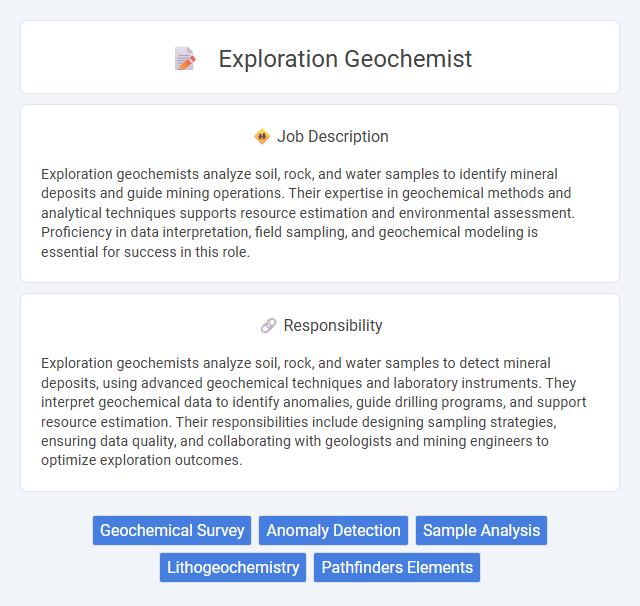
Exploration geochemists analyze soil, rock, and water samples to identify mineral deposits and guide mining operations. Their expertise in geochemical methods and analytical techniques supports resource estimation and environmental assessment. Proficiency in data interpretation, field sampling, and geochemical modeling is essential for success in this role.
Exploration geochemist roles probably suit individuals who thrive in outdoor and rigorous field conditions, as the job often involves traveling to remote locations and working in varied climates. People with a strong background in chemistry, geology, and analytical skills are likely to find this career fulfilling and well-matched to their abilities. Those who prefer routine office work or limited physical activity may be less compatible with the demands of exploration geochemistry.
Qualification
Exploration geochemists typically require a bachelor's or master's degree in geochemistry, geology, or earth sciences, with strong analytical and laboratory skills. Proficiency in techniques such as mass spectrometry, X-ray fluorescence (XRF), and inductively coupled plasma mass spectrometry (ICP-MS) is essential for analyzing soil, rock, and water samples. Experience in data interpretation, geographic information systems (GIS), and familiarity with mining or petroleum exploration environments significantly enhance job qualifications.
Responsibility
Exploration geochemists analyze soil, rock, and water samples to detect mineral deposits, using advanced geochemical techniques and laboratory instruments. They interpret geochemical data to identify anomalies, guide drilling programs, and support resource estimation. Their responsibilities include designing sampling strategies, ensuring data quality, and collaborating with geologists and mining engineers to optimize exploration outcomes.
Benefit
Exploration geochemists likely enjoy benefits such as opportunities for fieldwork in diverse and often remote locations, offering a dynamic work environment and practical experience with cutting-edge analytical techniques. They probably gain valuable insights into mineral deposits, aiding in resource discovery that can lead to significant career advancement and industry recognition. Competitive salaries and potential for travel also contribute to the attractiveness of this role within the geosciences sector.
Challenge
Exploration geochemist roles likely face challenges in accurately interpreting complex soil and rock geochemical data to identify mineral deposits with confidence. The probability of encountering unexpected variations in geochemical signatures requires adaptive analytical approaches and innovative problem-solving skills. Continuous technological advancements may demand ongoing learning to effectively integrate new methods into exploration workflows.
Career Advancement
Exploration geochemists analyze soil, rock, and water samples to identify mineral deposits, driving critical decisions in mining and resource extraction. Career advancement often leads to senior roles such as project manager, lead geochemist, or exploration manager, offering increased responsibility for directing exploration programs and budgets. Gaining expertise in advanced analytical techniques and data interpretation enhances prospects for leadership positions and specialized consultancy roles.
Key Terms
Geochemical Survey
Exploration geochemists conduct geochemical surveys to analyze soil, rock, and water samples, identifying mineral deposits and assessing their economic viability. They utilize advanced analytical techniques such as ICP-MS and XRF to detect trace elements and geochemical anomalies crucial for mineral exploration. Expertise in data interpretation and GIS mapping enhances spatial understanding of ore deposits, significantly aiding mining companies in resource evaluation and decision-making.
Anomaly Detection
Exploration geochemists specialize in analyzing soil, rock, and water samples to detect geochemical anomalies indicative of mineral deposits. Advanced anomaly detection techniques, including multivariate statistical analysis and geospatial modeling, enable precise identification of areas with elevated concentrations of target elements. Their expertise supports efficient targeting of drilling locations, reducing exploration costs and increasing the likelihood of successful mineral discovery.
Sample Analysis
Exploration geochemists specialize in sample analysis to detect and quantify mineral compositions, using techniques such as X-ray fluorescence (XRF), inductively coupled plasma mass spectrometry (ICP-MS), and atomic absorption spectroscopy (AAS). Precise geochemical data interpretation aids in identifying ore deposits and guiding drilling programs, enhancing economic viability assessments. Strong expertise in analytical instrumentation and quality control is essential for generating reliable geochemical datasets critical to exploration success.
Lithogeochemistry
Exploration geochemists specializing in lithogeochemistry analyze rock samples to identify mineral compositions and geochemical anomalies indicative of ore deposits. They utilize techniques such as X-ray fluorescence (XRF) and inductively coupled plasma mass spectrometry (ICP-MS) to detect trace elements and map geochemical signatures associated with mineralization. Their expertise supports targeted drilling campaigns and resource estimation by interpreting geochemical data within geological contexts.
Pathfinders Elements
Exploration geochemists specialize in analyzing pathfinder elements such as arsenic, antimony, and mercury to identify potential mineral deposits. These trace elements serve as geochemical indicators, guiding the discovery of valuable ores by signaling underlying mineralization. Detailed geochemical surveys and precise sampling techniques are vital for detecting anomalies related to economically important metals like gold, copper, and zinc.
 kuljobs.com
kuljobs.com